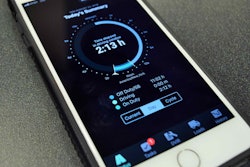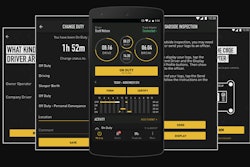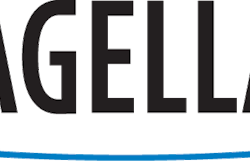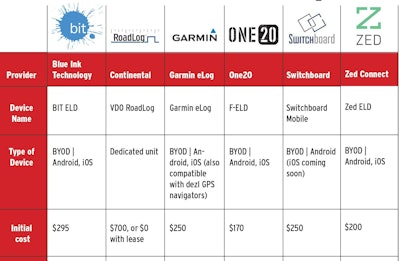
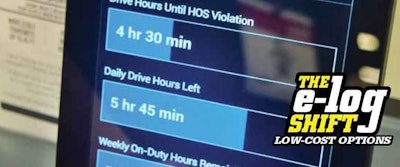
As efforts to derail the electronic logging device mandate continue to fail, more owner-operators and small fleet owners are considering their available options. With the mandate’s Dec. 18 enforcement date just under two months away, software and hardware providers old and new are trying to set themselves apart.
For the owner-operator who’s certain to be a part of the industry for a long time and who wants simplicity at a low price, the devices available without a monthly subscription fee can be a good match.
As of press time, six providers (see the chart below) offered either a dedicated-unit or BYOD (bring your own device) ELD available for a onetime purchase price. For the four BYOD devices here, freeware installed on a phone or tablet supports the engine plug-in for full in-cab and/or back-office functionality. For the one dedicated unit provider, Continental’s VDO RoadLog is supported via laptop software and USB-based data transfer device for updates.
Prices overall have continued to fall. What might be the most affordable device out there, One20’s provocatively named F-ELD, is available for $170 and even less for owner-operators eligible for discounts.
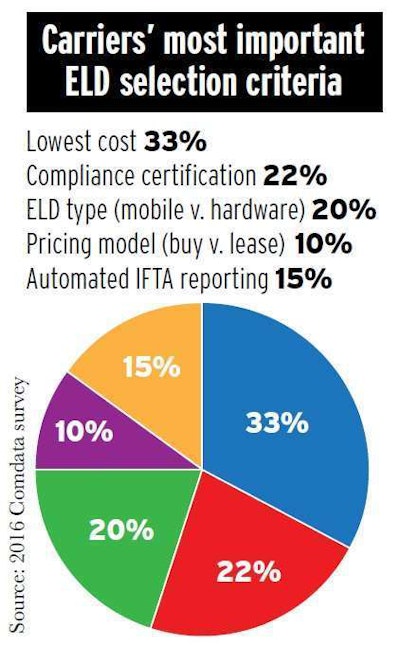

Cost was a factor for Utah-based Wade Spencer, owner-operator of a four-truck fleet of Freightliner Cascadias outfitted with Blue Ink Technology’s BIT ELD. The BIT electronic control module plug-in device is available for $295, ordered directly through the company’s website. Free smartphone/tablet apps available for both Android and iOS devices provide the driver interface.
For his reefer fleet, Spencer invested in four BITs for his own 2015 Cascadia, the truck of his Utah-based partner-owner and two operated by drivers in Ohio. To serve the company’s principal shipper account, Spencer and the partner load out of Utah and meet the company’s other two Ohio-based drivers In Morris, Illinois, to swap loaded reefers with the others’ empties. Adding ELDs was just another expense to be minimized. Spencer says his biggest issue with another BYOD ELD product he tried, BigRoad, was its monthly fee. BigRoad typically charges $25 per truck for full ELD service, though it’s recently discounted that for 1-2-truck fleets.
With BIT, he’s eliminated those fees and also mitigated an issue he saw with BigRoad and BYOD ELD competitor KeepTruckin. “They don’t leave things simple” when it comes to the driver’s navigation upon making changes, in Spencer’s view. “My partner’s 72 years old, almost done [trucking]. I’m 47. One of our [Ohio] drivers is 58 or 59, one is 68. I’ve got older drivers who can’t stand change and technology.”
With brothers Mike and Chris Riegel of Blue Ink Technology, Spencer believes he found a company committed to simplicity. “I said, ‘If you’re going to make changes, leave the old version, or have the option to leave the screens as they sit. I cannot deal with lots of changes with these guys who just don’t want to deal with technology.’ ” Spencer proposed a fix, and they accommodated that and other suggestions, he says.
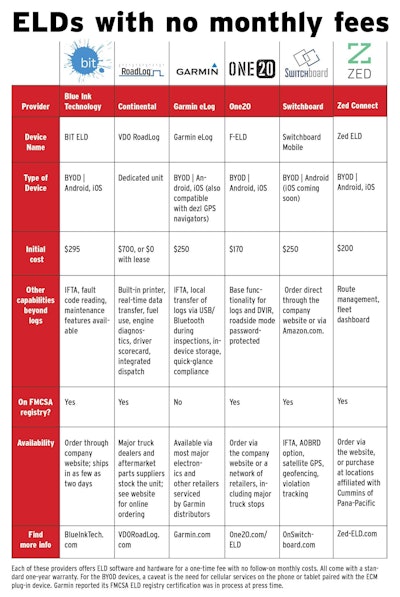
All of the companies featured in the chart to one degree or another sing the same tune, offering low costs and simplicity to appeal to the owner-operator/small fleet market.
Zed, whose Zed Connect ELD is its first product, was launched by Cummins as a separate but affiliated company to provide a bevy of technology features to fleets. Just after Zed’s launch early this year, sales director Jill Nowlin said “there are a lot of truckers out there who actually don’t want to have that monthly fee and the charges for a lot of things that aren’t applicable to their business.”
![The Zed ELD’s U.S.-based support team is available from 8 a.m. to 6 p.m. ET, says sales director Jill Nowlin. “Drivers have the ability to contact support straight from their [Zed] mobile app, direct calls or through the Fleet Management portal as well. They can also email through phone, app and the website.” Nowlin also expressed confidence, as did other suppliers featured in this story, in the company’s ability to replace a malfunctioning ELD unit in eight days or less, as the ELD final rule stipulates carriers must do.](https://img.overdriveonline.com/files/base/randallreilly/all/image/2017/10/ovd.ZED-ELD-2017-10-20-14-04.png?auto=format%2Ccompress&fit=max&q=70&w=400) The Zed ELD’s U.S.-based support team is available from 8 a.m. to 6 p.m. ET, says sales director Jill Nowlin. “Drivers have the ability to contact support straight from their [Zed] mobile app, direct calls or through the Fleet Management portal as well. They can also email through phone, app and the website.” Nowlin also expressed confidence, as did other suppliers featured in this story, in the company’s ability to replace a malfunctioning ELD unit in eight days or less, as the ELD final rule stipulates carriers must do.
The Zed ELD’s U.S.-based support team is available from 8 a.m. to 6 p.m. ET, says sales director Jill Nowlin. “Drivers have the ability to contact support straight from their [Zed] mobile app, direct calls or through the Fleet Management portal as well. They can also email through phone, app and the website.” Nowlin also expressed confidence, as did other suppliers featured in this story, in the company’s ability to replace a malfunctioning ELD unit in eight days or less, as the ELD final rule stipulates carriers must do.
Continental, meanwhile, has long spoken of its noncellular base model VDO RoadLog as an owner-operator-focused device. Sales manager Jeff Waterstreet notes ongoing confidence in that pitch, though the RoadLog is the most expensive among devices without monthly fees.
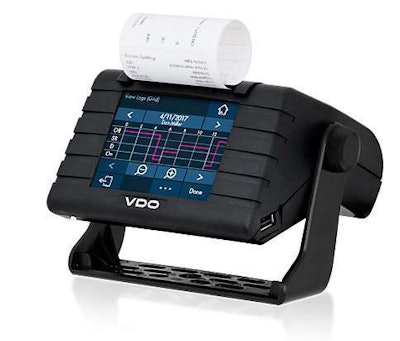 Continental’s VDO RoadLog is the only dedicated ELD with a built-in printer for log checks, which sales manager Jeff Waterstreet believes roadside enforcement is going to like as states continue to transition to electronic ELD data transfer. At press time, FMCSA continued to work on building out infrastructure for that, and most states had yet to be close to implementing it.
Continental’s VDO RoadLog is the only dedicated ELD with a built-in printer for log checks, which sales manager Jeff Waterstreet believes roadside enforcement is going to like as states continue to transition to electronic ELD data transfer. At press time, FMCSA continued to work on building out infrastructure for that, and most states had yet to be close to implementing it.“VDO is maybe the only appliance-type device that’s out there specifically designed to do the function” of recording hours of service, Waterstreet says. Also given that it doesn’t open up a cellular connection to the internet, Waterstreet believes it definitely will appeal to an owner-operator/small fleet interested in covering the need for an ELD with a device dedicated to logging and little else.
The company’s also positioned to service its user base in the event of malfunctions, given a distribution network that includes most major truck dealers. Hotshot owner-operator Buster Lewis, based near Charlotte, North Carolina, runs with the VDO RoadLog and lauds Continental’s technical support. “This company has treated me like I have a fleet of trucks,” Lewis says.
The RoadLog comes with a built-in printer and, as with the other products featured here, a one-year warranty, which the company honored twice in Lewis’ case after early iterations of the product gave him trouble.
Yet another trucking household name has gotten into this market, turning heads earlier in the year when it announced intentions to market a no-monthly-fee ELD product. Garmin’s eLog ECM plug-in ($250) is operable with BYOD Android and iOS devices and also is compatible with the company’s dēzl line of truck-specific GPS navigators. Says Tim Farrell, national accounts sales manager, “We saw a need for one that was not going to require a subscription and major installation processes with third parties being involved.”
The Garmin eLog plugs into the diagnostics port and has a built-in nine-pin connector. “We also include a six-pin adapter,” enabling it to cover the majority of commercial trucks, Farrell says, though Mack/Volvo is a bit different. Overall, though, “no subscription is a huge benefit,” boosted by the exclusion of the added cost of the six-pin adapter to cover those cases.
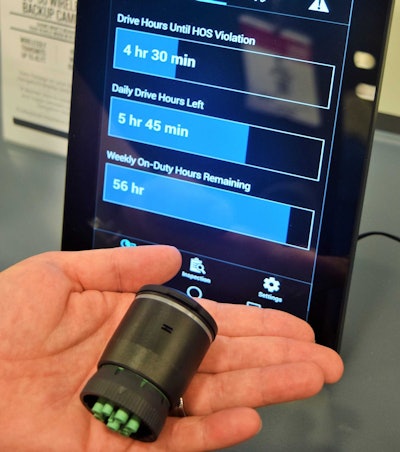 Longtime GPS device maker Garmin recently became just the fifth ELD provider out of more than 50 to offer a device that’s operable without a direct ongoing monthly service fee. Garmin’s eLog device, shown in the hand in this picture of a demo unit, retails for $250 and can pair with Android- and iOS-powered devices, as well as devices in Garmin’s dēzl line of GPS navigation devices.
Longtime GPS device maker Garmin recently became just the fifth ELD provider out of more than 50 to offer a device that’s operable without a direct ongoing monthly service fee. Garmin’s eLog device, shown in the hand in this picture of a demo unit, retails for $250 and can pair with Android- and iOS-powered devices, as well as devices in Garmin’s dēzl line of GPS navigation devices.As with other companies detailed in this story, Farrell sees his company’s pricing model as covering what is something of a hole in the ELD market, one that’s going to give all of them a leg up in the mad dash to adopt as Dec. 18 approaches.
“We’ve definitely tried to make sure we’ve got things set up with our distributor partners and key retailers that will be carrying it,” Farrell says. “It’s a sort of onetime thing. It’s a push all at once, and it may be a consistent sales volume after that.”

